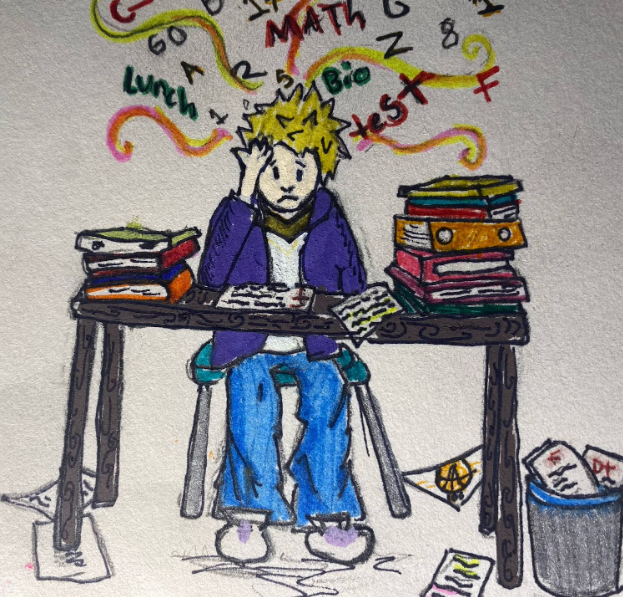After studying for 10+ hours for a big upcoming test, the heart-wrenching moment arrives for the test to be returned. You look at the paper and there is a big red “F” at the top right corner of the paper. This is the result of high-pressure testing. High-pressure testing has served as a benchmark for academic progression in many educational environments, but this focus on standardized testing doesn’t really assess academic achievement, rather it just cultivates stress among students. This stress makes it difficult for students to perform and do well regardless of how much they study or feel prepared for the test.
This idea is part of a growing debate on the effectiveness of high-stakes exams in schools. While some argue that these tests are essential for maintaining high academic standards and ensuring fairness in college applications and jobs, others believe they can do more harm than good, as students may start to prioritize cramming to get the best test scores rather than genuinely learning.
Some may claim that these exams are a fair way to evaluate students’ knowledge and skills, as they will all be held to the same academic standards. Furthermore, they argue that the pressure that comes with the testing will prepare students for the challenges they may face in the professional world, as it teaches them skills like time management and the ability to perform under pressure.
However, the reality of high-pressure testing paints a different picture. The emphasis on a major test at the end of the year and the pressure to perform can cultivate a “teach to the test” approach in the classroom. A study by Princeton University said, “Since the implementation of the No Child Left Behind Act (NCLB), states have administered annual standardized tests in Grades 3 through 8 measuring proficiency in state standards.” This leads teachers to focus on the material and concepts that will be on the test at the expense of a more holistic overall education. This method stifles creativity and minimizes the importance of critical thinking and problem-solving skills, which are necessary for the real world.
Moreover, these high-stakes tests can significantly increase stress among students. The pressure to perform well can lead to anxiety and burnout, which are counterproductive to both learning and mental health. A National Bureau of Economic Research (NBER) study highlights that stress levels, measured by cortisol, rise significantly during testing periods. This increase in cortisol levels can negatively impact cognitive functions like focus, and memory, leading to lower test performance. Additionally, a study from the American Psychological Association (APA) explains that high-pressure testing can lead to a range of negative health effects including poor sleep and increased anxiety, which not only affects the student’s performance on the test but their overall well-being as well. This shows that high-stakes testing can have long-term detrimental effects on students’ mental and physical health.
Ultimately, while standardized testing can help our education system, it is important to ensure balance. Standardized testing should not be the end-all-be-all and dominate the education system. Reducing the emphasis on high-pressure testing will not only help student stress levels, but also encourage a more comprehensive, engaging, and fair approach to education that truly prepares students for the challenges and experiences that come from the professional world.

